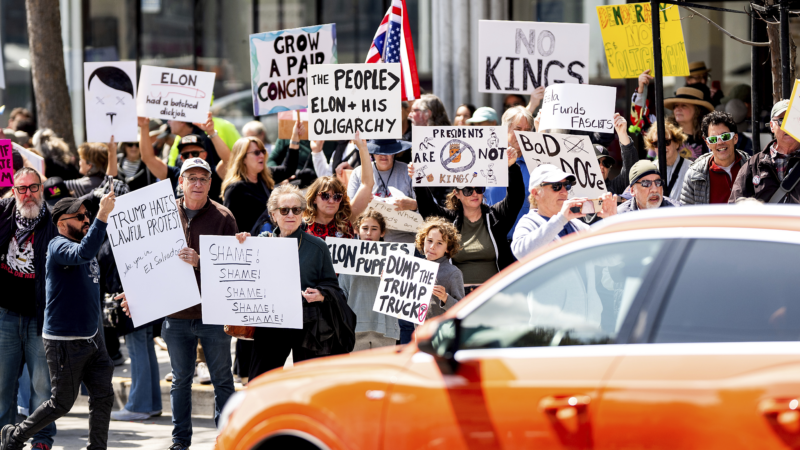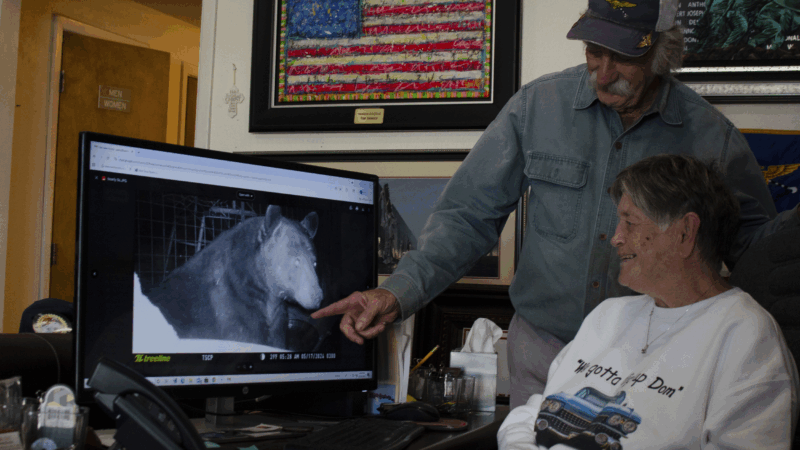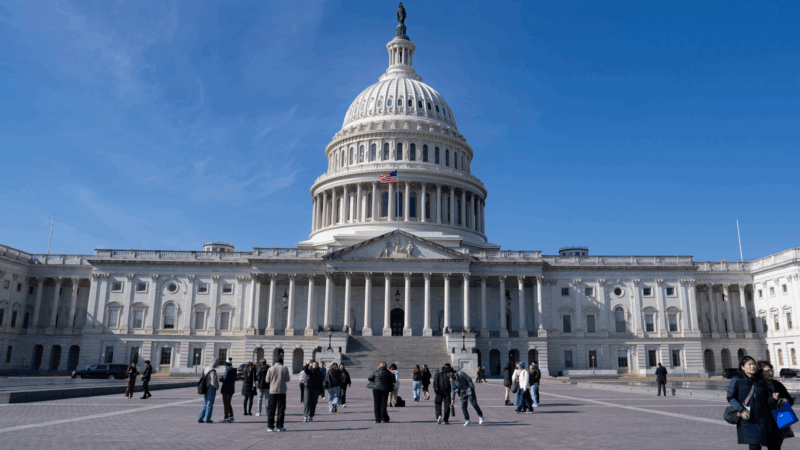Expert says Tesla’s best way to rebuild its brand is to ditch Musk
Protests against Tesla and its CEO Elon Musk took place across the country over the weekend and are spreading globally. The Tesla Takedown movement is urging people to sell their Tesla cars and stock.
Many are upset with Musk for his unelected but powerful role in the Trump administration. He heads the Department of Government Efficiency — DOGE, which has been making aggressive cuts across government. Both President Trump and Musk say the cuts are important to combat bureaucracy and fraud.
Tesla has experienced a decline in global sales, particularly in Europe and China. Since Musk’s political turn, investors have grown uneasy. But market analysts also question how much of the drop in Tesla sales and shares can be attributed to Musk’s actions alone.
Morning Edition spoke with branding expert Allen Adamson about Tesla’s struggles, which he attributes to several factors: Musk’s lack of focus on the company and innovation, the brand’s shifting public perception and the increasing role of politics in consumer decisions.
Adamson is the co-founder and managing partner of Metaforce, a marketing consultancy, and the author of Seeing the How: Transforming What People Do, Not Buy, To Gain Market Advantage, which is about consumer behavior, behavioral psychology and marketing analysis.
The interview has been lightly edited for length and clarity.
A Martínez: So, Allen, why are Tesla sales falling right now in particular? Is it about Elon Musk’s work at DOGE or is it maybe something else?
Whenever a business fails, it’s never about one thing. Or a brand gets into trouble. It’s usually about many things. So the brand problems now are: his DOGE issue, his Cybertruck recall… lots of things. It’s having a cumulative effect and it’s reached the tipping point.
Martínez: Have there been other examples that you could point to in the past where something that a CEO has said or done affected their company sales?
Not in the car industry, for sure. There are smaller examples, but nothing at this scale.
Martínez: Allen, what is it about cars that make it such a different market than other products? Is it one of those things where, when you buy a car, it says something about you, without saying anything at all, necessarily?
Most people think, ‘I bought the car because it has good acceleration. I like the way it steers.’ But when you look at car performance, there’s no difference between cars. They all get roughly the same mileage, either electric or gas. You look inside, they all hook up to your smartphone. In fact, when you get in many cars, and if you don’t look at the brand, you have no idea what car you’re in. And so cars are what we call badge brands. They are identity signals. They say, ‘I’m driving a BMW, I’m driving a Ford pickup truck,’ because it says something about you. It’s more like a beer brand and a fashion brand. You park it in a driveway to say, ‘Look at me. I’m a green person. I’m driving a Tesla, or look at me, I’m a real macho person, I’m driving this big pickup truck.’ And so cars are always about the brand image and once the brand image is not something you want to say to your neighbors, you’re in big trouble in a category that’s brand-driven.
Martínez: But would it be easy if, say, for some reason, he divests in Tesla, sells every bit of stock and ownership stake that he has in Tesla, and then all of a sudden, has nothing to do with the brand?
That would probably be the best thing for the brand. That’s the only easy fix, which is, ‘I’m selling it, I’m going to focus on other things I’m interested in.’ And the new ownership team is going to keep their eye on the ball. Because I think the issue is focus. If you’re building a car that has your life at stake when you drive it, you don’t want a brand perception that the people at a company are moving fast and breaking things. You want somebody you can trust to say, ‘when I get in this car, the wheels aren’t going to fall off or I’m not going to get killed.’ So having this sort of erratic personality is probably a more damaging brand attribute than helping the government try to save money on federal employees.
Martínez: So I think the lesson here for any current CEO or aspiring CEO is maybe don’t ever talk politics publicly.
That’s always been a lesson, and now, the more polarized the country is, the more true it is. And it will be a good lesson for other CEOs to say, ‘look, as much as my employees want me to speak out or I want to speak out, less is more.’
Are we in a recession? Maybe professional Santas can tell us
Demand for professional Santas and other seasonal workers seems to have cooled. Could that be a sign we're in a recession?
Black bear populations are bouncing back. Here’s how these Texas towns are coping
Historically, Black bears were the biggest predator to travel the Big Bend area of Texas. But overhunting and habitat loss led to their decline.
A 101-year-old runs the largest nutcracker museum in the U.S. Here’s a look inside
Arlene Wagner has been collecting nutcrackers for nearly 50 years. Now, she's got one of the largest collections in the world, housed at the Leavenworth Nutcracker Museum in Washington.
The GOP has allowed Trump to expand his authority. Here’s where they’re pushing back
Republicans in Congress have shown some willingness to push back on President Trump, but it is not clear how far they are willing to push back against the leader of their own party.
After NIH grant cuts, breast cancer research at Harvard slowed, and lab workers left
Amid NIH funding delays, reversals and uncertainty, a scientist at Harvard who studies breast cancer has lost one-third of her lab employees and wonders if she can continue her research experiments.
The 25 Best Songs Of 2025
From the breakout Brooklyn band Geese to the Puerto Rican star and soon-to-be Super Bowl halftime performer Bad Bunny and dozens in between, NPR Music shares its picks for the best songs of 2025.









